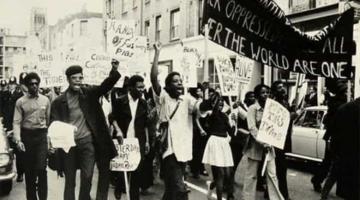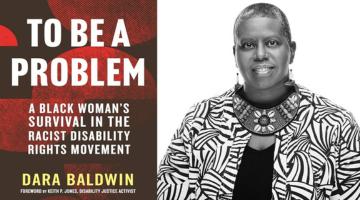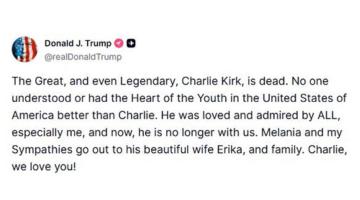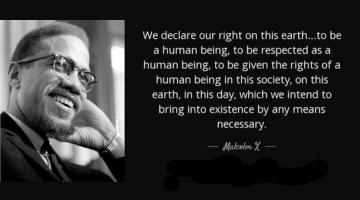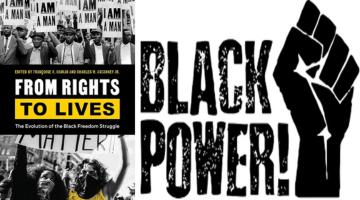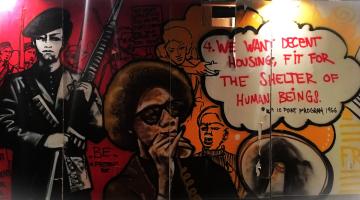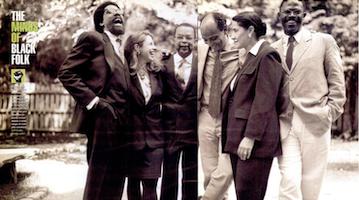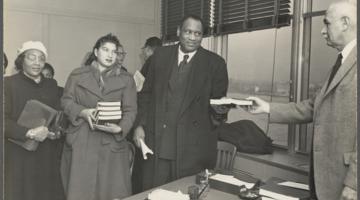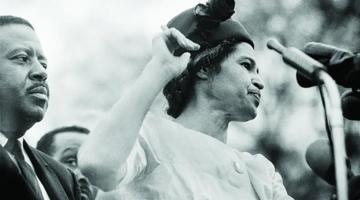The late John H. Bracey, Jr. argued that Black Studies should be wedded to African liberation, not to the corporate-bureaucratic structure of the university.
The first week of this year’s Black History Month has been terrible and tumultuous for Black Studies. First, Florida Führer Ron DeSantis focused his fascist fury on the future of African American Studies on the College Board Advanced Placement curriculum. Then, we lost one of the giants of the field: Professor John H. Bracey, Jr., of the University of Massachusetts, Amherst passed away at the age of 81.
Of the two events, Bracey’s death is a much greater loss.
Certainly, the attack on the College Board’s African American Studies AP class is an alarming part of a much broader set of right wing attacks on culture and knowledge – and, specifically, on Black people. But the AP itself is not without its problems. The College Board is a private, unregulated, for-profit institution that siphons funds from public schools in order to promote the class status of the elite – via the AP exam. College Board CEO David Coleman makes $2 million in salary and the corporation held $1.6 BILLION in cash and investments in 2021. Meanwhile, the original Black Studies content of the AP exam, created by a group of highly-paid, NDA-signing parasites – excuse us, professors – could be seen as a watered-down, bullet-pointed, content-gutted PowerPoint presentation. The College Board caved to right-wing fascism, stripping away a good chunk of the curriculum. To be sure, AP curriculums are narrow and superficial, and they are structured around taking the AP exam. The Black Studies curriculum was no different. If we really wanted a radical abolitionist education, the College Board would be disbanded and Black Studies would be made a constituent part of all education.
John H. Bracey, Jr., meanwhile, not only represented the best of Black Studies, but spent a lifetime uplifting Black Studies’ best. Born in Chicago, he attended Howard University and Roosevelt University, where he studied with St. Clair Drake. Bracey was an activist in the civil rights, Black liberation, and peace movements, working with the Congress of Racial Equality, Chicago Friends of the Student Nonviolent Coordinating Committee, Students for a Democratic Society, and the Revolutionary Action Movement. He joined the faculty of the University of Massachusetts in 1972 where he helped create one of the first doctoral programs in African American studies. As a scholar, Bracey not only wrote on Black life and history, but he did the kind of documentary and bibliographic grunt work that gave textual substance to the field. Check out the incredible 1970 anthology Black Nationalism in America, for instance. Coming in at almost 600 pages, it covers everything from Richard Allen and the founding of the AME Church in 1816 to the Black Panther Party Program in 1968. This is Black Studies.
In 2009, Bracey gave a presentation at a conference held at Temple University celebrating the 40th anniversary of the first African American Studies Program. His remarks were published two years later as “Black Studies in the Age of Obama” in the journal Socialism and Democracy. It is a short and powerful piece that reflects on Black Studies history and future, charting its beginnings as a pugilistic outsider born as the intellectual wing of a political movement, to its current status as a professional insider ensconced in a corporate-bureaucratic structure. For Bracey, despite this transformation, the role of Black Studies remained: subjecting society to the most serious analysis, understanding conditions of oppression and struggle, and seeking to mobilize this knowledge for the liberation of African peoples and all other exploited groups. Bracey also argued that Black scholars, many of whom were so enamored of Obama that they seem to lose their ability for critical thinking, must subject Obama to “our most rigorous and principled scrutiny.”
While Bracey ends the essay with a cautiously optimistic note concerning the election of Barack Obama, one wonders how he would assess the years since. We can be sure, however, that Bracey’s demand that Black Studies be ruthlessly critical about the policies of the first Black President would extend to any member of the contemporary Black elite, be they in the political class or the entertainment industry.
Otherwise, is Black Studies any better than a College Board performance? We reproduce Bracey’s essay below.
Rest in power, John H. Bracey, Jr. (1941–2023).
Black Studies in the Age of Obama
John H. Bracey, Jr.
In assessing the state of African American Studies from its origins as the academic wing of the Black liberation movements of the 1960s to the onset of the presidency of Barack Obama, it may be helpful to consider Max Weber’s classic analyses of bureaucracy and also the insights of C.L.R. James on the relationship of intellectuals to mass social movements.
Routinization of charisma/bureaucratization
Few would doubt that the movements that generated the rapid increase in numbers of African American students in US institutions of higher education during the period from 1967 through the mid- 1970s no longer exist. As early as the mid-1970s, observers such as St. Clair Drake remarked on the taming of Black Studies as a field. By this he meant the shifting of the major focus of efforts and concerns from the community at large to the campus and the professional organizations based on academic disciplines. The audience was no longer the broader Black community – both in and outside the academy – but rather institutional and disciplinary colleagues and peers.
The receding of the high tide of the 1960s liberation struggles left many of us in fledgling Black Studies departments or programs in a condition that my grandparents would have described as “it’s root hog or die.” And those of us who have survived over the years with any degree of success had to master the politics and bureaucracies of the Institutions in which we were employed, or “die.”
The dynamic speeches, manifestos, calls to arms, rallies, marches, etc. yielded to memos to deans, provosts or chancellors, to interminable meetings about personnel decisions, outside evaluations, self-studies, fundraising campaigns and the like. The set of skills, talents, and attitudes that enabled us to breach the walls of academe were different from those necessary to survive once inside. (We all of course reserve the God-given Negro right to “go off on white folks” at least once a year just to keep them on their toes and off your back.) That aside, a good chunk of our time and energy by necessity had to be devoted to satisfying the demands of the modern bureaucracy that is the college or university. All the rhetoric we use about commitment to a larger community and struggle is often puzzling to our current students who don’t see any movement to attach themselves to or any struggles of the type that we have described to them. The vast majority of them have little if any experience with political organizations in their home communities. The world of crack, AIDS, and lethal gang violence is not the world that “us old heads” grew up in.
Our students want knowledge about themselves, their history and culture, but the political and economic system that they must engage in demands that they find a way to get a job that will allow them to begin to pay back the financial debt that they have incurred in securing a college education, while trying to maintain what they see as a reason- able standard of living. They do not have the luxury that many of our generation had, to study the subjects that interested us or that were relevant to our political concerns.
When we were attending school, “black studies” did not exist. Our political efforts, both on and off campus, called into being the jobs that we now hold. The faculty that we are hiring to replace us is not and cannot be “movement” people. They generally are quite intelligent, hard-working individuals, dedicated to studying the aspect of the African American experience that interests them. But they also care about research grants, reappointment, promotion and tenure, and the material rewards offered by academia that concerned us only secondarily, if at all. They live in a world where worth is determined overwhelmingly by market value. How much you make and where you make it is important to them. That is the hand they have been dealt and that is the hand that they play. The charisma of Black Studies has been routinized “big time.”
C.L.R. James
Does this mean that Black Studies are irrelevant, that its time has passed, that what we do is of no consequence? Of course not. Our ongoing indispensable task is to continue to work as diligently, as hard, and as honestly as we can to prepare our students to survive, function and advance in a society whose fundamental assumptions are still anchored in a belief in white supremacy. Is the racism of today different from the racism of the 1950s, 1940s and 1930s? Was Jim Crow different from slavery? Of course. Does the existence of Barack Obama signify that racism has disappeared? Of course not. Our challenge is to think through the complexities of this new reality, ground our conclusions on evidence that is persuasive to as many of our people as possible, and produce work that will stand the test of time. We still read The Souls of Black Folk because it made sense in 1903 and it makes sense today. Teaching students through an analysis of past events is more about teaching them how to evaluate conflicting assumptions, explanations, and interpretations of different forms of what we call evidence, than about filling their heads with random bits of information no matter how interesting.
Where does C.L.R. James come into this process? James tells us what should be the role of intellectuals who make at least some claim to being committed to the transformation of the existing social order to one based on more humane and just principles. James thought, wrote and acted on the belief that if there was a movement or group of working people – not the ruling classes or their lapdogs and running dogs (don’t you just love that language, so clear, so precise) – then the task of the revolutionary intellectual was to put his/her talents in their service. The task was not to lead the masses anywhere, but to work with them to help them get where they want to go. The intellectual task is to clarify issues, i.e. to make complicated matters simple, not make simple matters complicated.
In the absence of a movement of any significant size and strength, the task of the intellectual is to try to see what James called “the future in the present.” By this he meant that a serious effort should be devoted to the study of any and all tendencies, trends, ideological currents, patterns of behavior, cultural artifacts, etc. that could be interpreted as being in opposition to the dominant order. James’s modern politics and his studies of art, literature, sports, film and some other aspects of popular culture were part of his attempt to identify, interrogate, and analyze possible sites and instances that could either encourage or coalesce into forces of radical transformation. The role that James thought Black Studies could play, if it was to have a serious role at all, was to reveal and explain the relationship between the specific conditions and struggles of peoples of African descent and those of other oppressed and exploited peoples and groups.
James focused on political, intellectual and cultural trends in the broadest possible terms, with no concern at all for the limitations imposed by the ways that colleges and universities defined, produced, and disseminated knowledge. You looked for signs of the future in the present wherever they might appear. To confine one’s intellectual work, as James used to say, to writing books about other people’s books was a waste of time and irrelevant at best, counterproductive and reactionary at worst. This to James was the major shortcoming of university-based intellectuals. To lay claim to James’s legacy means not only to study modern society, but to link your studies to the struggles for social transformation which to James meant socialism.
If James is to be our guide, then we in Black Studies should subject the ideas and actions of Barack Obama to our most rigorous and principled scrutiny. We should be as precise and as detailed as possible in writing or talking about why we support or oppose any particular policy or action. This type of work can be included under the current umbrella of Black Studies even while we continue to teach about the social, historical and cultural experiences of African Americans during the pre-Obama period that extends from Africa at least during the time of the slave trade and slavery, through the dispersal of peoples of African descent throughout the western hemisphere, through the periods of Civil Wars and emancipations, post-emancipation adjustments, the rise of Jim Crow and disenfranchisement, and the struggles of African Americans to dismantle that apparatus in the second half of the twentieth century. Our works of art and literature will contain critiques of what now exists as well as glimpses of a more just and humane future.
How artists will do this, and to what extent, will of course be based on their individual interest and talents. That the range of artistic expression in all genres is as broad as it has been at any time in our history is to be welcomed despite our many and legitimate critiques of some of its forms and content. I believe that James’s many writings still have much to offer us and our students in our search for ways to understand the world in which we live.
Conclusion
So where does all this leave us? If the Obama presidency is to have any lasting effects beyond his personal success and the success of his pro- grams (read CHANGE WE CAN BELIEVE IN), then we in Black Studies, if we are not just blowing smoke or living off past glories to make our- selves feel good and to rationalize our positions of relative privilege within our communities, have to renew and intensify our struggles to achieve the goals we set for ourselves four decades ago. Establishing Black Studies in the academy was a good beginning, but there is much work left to be done. The Obama presidency gives us hope that things are moving again and space for us to renew our struggle.
John H. Bracey Jr., “Black Studies in the Age of Obama,” Socialism and Democracy, 25 no. (2011) 1 , 9-12

